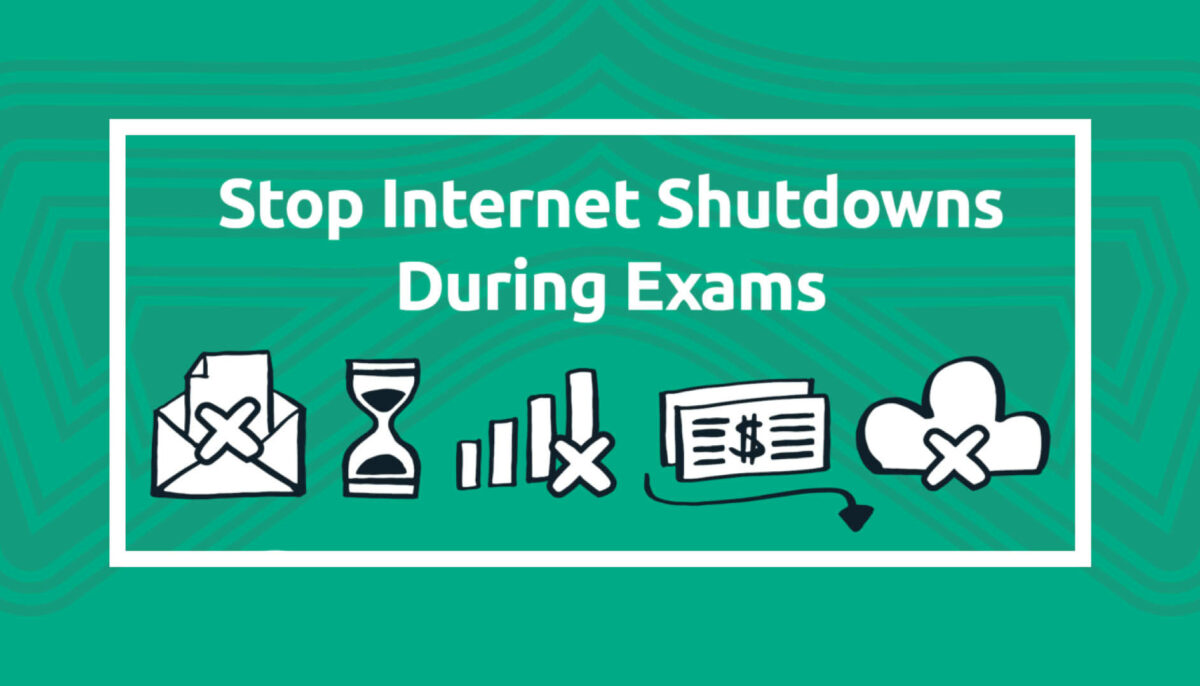This year, governments in the Middle East and North Africa have continued to shut down and throttle the internet during grade and high school examinations. So far, governments in Jordan, Syria, Algeria, and Sudan have disrupted the internet during examinations. We call on governments across the region to refrain from restricting access to the internet during examinations and violating people’s right to access the internet.
This phenomenon began in 2015, when Syria and Iraq shutdown the internet during end-of-the-year baccalaureate exams, Algeria followed suit in 2016, and Mauritania joined the club just one year later. This year, Sudan’s new government elected to disrupt the internet during exams as well. These states justify the shutdown as a method to prevent cheating, but exam questions still get leaked and offline cheating methods are widespread. Moreover, these disruptions hurt the economy and restrict people’s right to communicate freely.
Jordan
In Jordan, rather than shutting down the internet, the Ministry of Education blocked the most popular communication applications during the high school examinations. Per the request of the Ministry, The Telecommunications Authority banned: Telegram, Facebook messenger, Viber, Line, Tango, WhatsApp, and IMO. According to the Telecommunication Authority, the blockages lasted from approximately 10:00 and ended at 14:00 local time from July 1 and July 23, 2020.
The Jordanian Open Source Association (JOSA), condemned the applications’ block during the exams, stressed that exams are not a valid reason to block access to the internet, and urged the ministry to find other ways to limit cheating.
منع الغش في امتحانات الثانوية العامة ليس ذريعًا لحجب التطبيقات مثل واتساب وانستغرام. ندعو وزارة التربية والعليم @edugovjo إلى أن تبحث عن طرق بديلة أكثر جدوى لمنع الغش دون المساس بحقوق المواطنين في الحصول على خدمة الإنترنت دون قيود. pic.twitter.com/JCQas2kgIb
— Jordan Open Source Association (@jo_osa) July 1, 2020
Syria
In Syria, one of the first countries in the region that resorted to this technique, the government shut down the internet during the second round of the high school exams. On a daily basis, the government cut the internet between August 22 and August 31, 2020. According to Oracle’s Internet Intelligence the blackout lasted for five and a half hours each day.
5.5-hour total internet blackout in Syria today to combat cheating on high school final exams – a practice that began in 2016.https://t.co/daM97tbToE pic.twitter.com/H6NLNRnDNB
— InternetIntelligence (@InternetIntel) August 22, 2020
Algeria
In Algeria, the high school exams took place from September 13 to September 17. Two days before the exams, sources from Algeria told SMEX that the connection slowed down, and they suspected that there was internet throttling to prevent early exam leakage. During the scheduled exam period, sources reported the blackout was applied everyday between 7:30 and 18:00 local time.
According to one source, “Even after the exams, the connection was too slow; we were barely able to open our email and WhatsApp. Everything else was too slow to open”. Fing, an online platform that monitors local internet traffic and connection drops, was the only tool that was able to detect the blackout. Based on the available data, SMEX believes that the block was on the DNS level, meaning users were not able to access websites.
The internet disruption is still happening in #Algeria.
According to this data from @fingapp the connection dropped around 55% over @Algerie_Telecom.
However users inside Algeria reports that it’s a total blackout. pic.twitter.com/CS8m9EyzGf— Ali Sibai (@alisibai) September 17, 2020
Sudan
The latest newcomer to this exclusive club is Sudan. On September 16, ZAIN Sudan notified its subscribers via SMS that there will be an internet blackout between 8:00 and 11:00 local time. ZAIN Sudan explained that the blackout is due to the high school exams, which are taking between September 16 and September 24.
This morning at 8:15 AM. It’ll comeback again at 11:00 AM after finishing the exam session. This process will continue until September 24, 2020.
Below picture is the notification from ZAIN SUDAN. pic.twitter.com/hQkhyVJrWD— Khattab – خَطَّٰاْبّ🇸🇩 (@ga800l) September 16, 2020
Governments in the MENA region regularly censor websites and shutdown the internet during elections and protests, and in recent years they have more commonly used this tactic during exams.
We call on governments across the region to stop shutting down the internet at all times. The national economies incur huge economic losses as a result of the internet shutdowns. More importantly, these blackouts inhibit free expression and allow government forces to commit human rights violations without evidence or recordings against them.
Tweet using the hashtag #NoExamShutdown to report internet shutdowns in your country and demand your government protect an open internet because connectivity is a human right.



